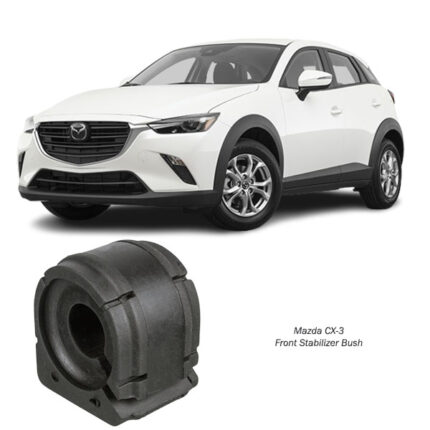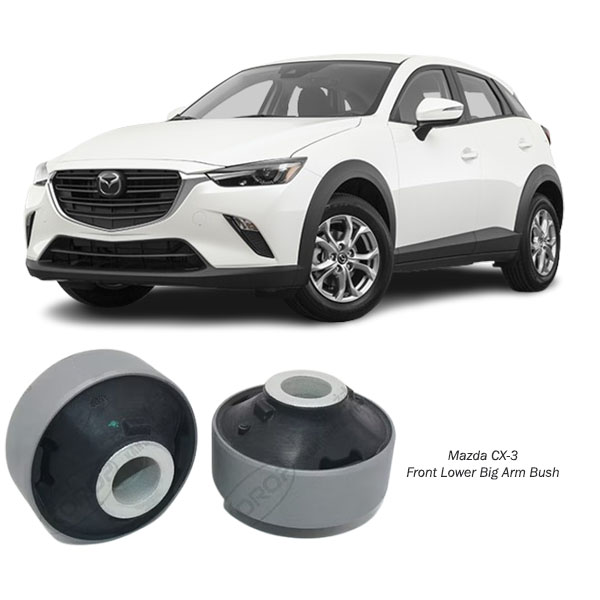-20%
Get Mazda CX-3 Front Lower Big Arm Bush D10E-34-460 in Kenya
The front lower big arm bush is a critical component in a vehicle’s suspension system, contributing significantly to ride quality, steering precision, and overall stability. This guide delves deep into its function, construction, importance, and maintenance, helping car owners and professionals understand its role in modern vehicles.
What is a Front Lower Big Arm Bush?
A front lower big arm bush, commonly referred to as a suspension bushing, is a small yet essential part that connects the lower control arm (often called the big arm) to the vehicle’s chassis. Made primarily of durable rubber or polyurethane, the bushing absorbs road shocks, vibrations, and noise while allowing the control arm to pivot smoothly. This flexibility is vital for maintaining the alignment of the wheels and ensuring a comfortable driving experience.
Functions of the Front Lower Big Arm Bush
- Shock Absorption
The bush acts as a cushion between the control arm and the chassis, reducing the impact of road irregularities, such as potholes and speed bumps. By minimizing shocks, it enhances passenger comfort and protects other suspension components. - Noise Reduction
Without the bush, metal components of the suspension system would come into direct contact, creating excessive noise. The rubber material of the bush dampens these vibrations, ensuring a quieter ride. - Maintaining Wheel Alignment
The bush helps maintain the correct positioning of the control arm, which is crucial for accurate wheel alignment. Proper alignment improves handling and reduces uneven tire wear. - Enhancing Steering Precision
By providing controlled movement of the control arm, the bush contributes to responsive and stable steering, especially during cornering or sudden maneuvers.
Construction and Materials
Front lower big arm bushes are typically constructed from the following materials:
- Rubber Bushings
- Pros: Excellent vibration damping, cost-effective, widely used in OEM (Original Equipment Manufacturer) applications.
- Cons: Susceptible to wear and tear, less resistant to extreme temperatures or chemicals.
- Polyurethane Bushings
- Pros: Greater durability, resistance to oil, chemicals, and extreme temperatures. Ideal for performance-focused vehicles.
- Cons: Slightly stiffer, which can transmit more vibrations to the cabin.
- Metal Sleeves
The bush often includes inner and outer metal sleeves to provide structural support and ensure secure mounting to the control arm and chassis.
The choice of material depends on the vehicle type and intended use. Daily drivers typically use rubber bushes for comfort, while performance vehicles might prefer polyurethane for durability and handling precision.
Signs of a Failing Front Lower Big Arm Bush
- Clunking or Knocking Noises
A worn-out bush can create metallic noises, particularly when driving over bumps or uneven surfaces. - Vibration in the Steering Wheel
Excessive wear can lead to increased vibrations, which may be felt in the steering wheel during normal driving. - Uneven Tire Wear
Misalignment caused by a failing bush can result in uneven tire tread wear, leading to premature tire replacement. - Poor Handling and Steering Response
A damaged bush may compromise the vehicle’s stability, causing it to feel loose or less responsive during cornering or sudden braking. - Visual Inspection
Cracks, tears, or excessive wear in the rubber material during a visual inspection indicate the need for replacement.
Importance of Regular Maintenance
- Prolongs Suspension Life
Healthy bushes reduce stress on other suspension components, such as the control arms, ball joints, and struts, extending their lifespan. - Improves Safety
Properly functioning bushes ensure that the vehicle remains stable and responsive, reducing the risk of accidents caused by poor handling. - Enhances Comfort
Replacing worn-out bushes restores ride quality and noise insulation, improving the overall driving experience.
Replacement Process
Replacing the front lower big arm bush is a specialized task typically performed by a qualified mechanic. Here’s an overview of the process:
- Lifting the Vehicle
The car is raised on a hydraulic lift to access the suspension system safely. - Removing the Control Arm
The lower control arm is detached from the chassis and suspension components. - Extracting the Old Bush
The worn-out bush is pressed out using a hydraulic or mechanical press. - Installing the New Bush
The new bush is carefully pressed into the control arm, ensuring a secure fit. - Reassembly and Alignment
The control arm is reinstalled, and the vehicle undergoes a wheel alignment to ensure proper suspension geometry.
Factors Affecting Longevity
- Driving Conditions
Off-road or rough terrain driving exposes the bushes to higher levels of stress, leading to faster wear. - Material Quality
High-quality rubber or polyurethane bushes last longer and perform better under demanding conditions. - Maintenance Practices
Regular inspections and timely replacements prevent other suspension components from being damaged due to a failing bush. - Load on the Vehicle
Overloading the vehicle increases pressure on the suspension system, accelerating bush wear.
Aftermarket vs. OEM Bushes
- OEM Bushes
- Manufactured by the vehicle’s original manufacturer.
- Guaranteed to fit and perform according to factory standards.
- Typically more expensive.
- Aftermarket Bushes
- Produced by third-party manufacturers.
- Often available in performance-oriented designs.
- May vary in quality; it’s crucial to choose a reputable brand.
Tips for Choosing the Right Bush
- Match with Vehicle Specifications
Always select a bush that matches the make, model, and year of the vehicle. - Consider Driving Needs
Opt for rubber bushes for daily driving comfort or polyurethane for enhanced durability and performance. - Check Reviews and Recommendations
Research brands and read customer reviews to ensure reliability and quality.
Cost of Replacement
The cost of replacing a front lower big arm bush varies depending on factors such as the type of vehicle, labor rates, and the quality of the bush. While the bush itself is relatively inexpensive, labor costs can add up due to the complexity of the replacement process.
Preventive Maintenance Tips
- Regular Inspections
Include suspension bushings in routine vehicle inspections, especially during oil changes or tire rotations. - Address Issues Promptly
Replace worn bushes immediately to prevent further damage to the suspension system. - Avoid Overloading
Stick to the vehicle’s recommended load capacity to reduce stress on the suspension. - Drive Smoothly
Avoid aggressive driving and sudden impacts, which can accelerate bush wear.
Conclusion
The front lower big arm bush is a small but vital component in your vehicle’s suspension system. It enhances ride quality, improves handling, and protects other suspension parts from excessive wear. Regular inspections, proper maintenance, and timely replacements ensure optimal performance and safety. By understanding the function and importance of this component, car owners can maintain their vehicles in excellent condition and enjoy a smooth, comfortable ride.
Follow us on Facebook for more parts.




Reviews
Clear filtersThere are no reviews yet.